Penalties under Income-Tax Act, 1961
"Under the Income-tax Act, penalties are levied for various defaults committed by the taxpayer. Some of the penalties are mandatory and a few are at the discreti"
TaxGuru is a platform that provides Updates On Amendments in Income Tax, Wealth Tax, Company Law, Service Tax, RBI, Custom Duty, Corporate Lawu00a0, Goods and Service Tax etc.
To know more visit https://taxguru.in/income-tax/penalties-income-tax-act-1961.html
Share Presentation
Embed Code
Link
Download Presentation

tax6 + Follow
Download Presentation
Penalties under Income-Tax Act, 1961
An Image/Link below is provided (as is) to download presentation Download Policy: Content on the Website is provided to you AS IS for your information and personal use and may not be sold / licensed / shared on other websites without getting consent from its author. Content is provided to you AS IS for your information and personal use only. Download presentation by click this link. While downloading, if for some reason you are not able to download a presentation, the publisher may have deleted the file from their server. During download, if you can't get a presentation, the file might be deleted by the publisher.
Presentation Transcript
- PENALTIES UNDER INCOME-TAX ACT,1961 https://taxguru.in/income-tax/penalties-income-tax-act-1961.html Article discusses about Income Tax Penalties for default in making payment of Self Assessment Tax/ Payment of Tax/failure to comply with notice issued under section 142(1) or 143(2) or direction for audit under section 142(2A)/ under reporting and misreporting of income/ Failure in maintain information and document of international transaction or specified domestic transaction/ in case of Search, Late filing fees for delay in filing the TDS/TCSstatement,Etc. Penalties Under The Income-TaxAct Introduction Under the Income-tax Act, penalties are levied for various defaults committed by the taxpayer. Some of the penalties are mandatory and a few are at the discretion of the tax authorities. In this part, you can gain knowledge about the provisions relating to various penalties leviable under the Income-taxAct. Penalty for default in making payment of Self AssessmentTax As per section 140A(1) any tax due (after allowing credit for TDS, advance tax, etc.) along with interest andfee* should be paid before filing the return of income. Tax paid as per section 140A(1) is called ‘self-assessmenttax’. As per section 140A(3), if a person fails to pay either wholly or partly self-assessment tax or, interest, or fee* then he will be treated as assessee in default in respect of unpaid amount. As per section 221(1), if a taxpayer is treated as an assessee in default, then he shall be held liable to pay penalty of such amount as the Assessing Officer may impose and in the case of a continuing default, such further amount or amounts as the assessing officer may, from time to time, direct. However, the total amount of penalty cannot exceed the amount of tax in arrears. Before charging penalty under section 221(1), the tax authority shall give the taxpayer a reasonable opportunity of being heard. No penalty is levied if the taxpayer proves to the satisfaction of the tax authorities that thedefault was for good and sufficientreason. Note: An assessee shall not cease to be liable to any penalty under section 221(1) merely by reason of the fact that he paid the tax before the levy of suchpenalty. * Fee for default in furnishing return of income shall be Rs. 5,000 if return has been furnished after the due date prescribed under section 139(1). However, it shall be Rs. 1,000 if the total income of an assessee does not exceed Rs. 5lakh.
- Penalty for default in making payment ofTax As per section 220(1), when a demand notice under section 156 has been issued to the taxpayer for payment of tax (other than notice for payment of advance tax), then such amount shall be paid within a period of 30 days of the service of the notice at the place and to the person mentioned in the notice. In certain cases, the above period of 30 days can be reduced by the tax authorities with the previous approval of designated authorities. If the taxpayer makes default in payment of any tax due from him, then apart from other penal provisions, he is treated as an assessee indefault. As per section 221(1), if a taxpayer is treated as an assessee in default, then he shall be liable to pay penalty of such an amount as the Assessing Officer may impose. However, penalty cannot exceed the amount of tax in arrears. Thus, penalty under section 221(1) is a general penalty and can be levied in all the cases in which the taxpayer is treated as an assessee indefault. Before charging penalty as discussed above, the tax authorities shall give the taxpayer a reasonable opportunity of being heard. No penalty is levied if the taxpayer proves to the satisfaction of the tax authorities that thedefault was for good and sufficientreason. Note: An assessee shall not cease to be liable to any penalty under section 221(1) merely by reason of the fact that he paid the tax before the levy of suchpenalty. Late filing fees for delay in filing the TDS/TCSstatement As per section 200(3) every person liable to deduct tax at source is liable to file the statement in respect of tax deducted by him i.e. TDS return. Further, as per proviso to section 206C(3) every person liable to collect tax at source has to furnish statement in respect of tax collected by him i.e. TCS return. Section 234E provides for levy of late filing fees for the delay in filing TDS/TCSreturn. As per section 234E, where a person fails to file the TDS/TCS return on or before the due date prescribed in this regard, then he shall be liable to pay, by way of fee, a sum of Rs. 200 for every day during which the failure continues. The amount of late fees however shall not exceed the amount of TDS/TCS. TDS/TCS return cannot be filed (after prescribed due date) without payment of late filing fees as discussedabove.
- Fee for default in furnishing return ofincome If assessee who is required to furnish return of income under section 139 failed to furnish return of income within due date as prescribed under section 139(1) then as per section 234F, he will be required to pay fee of Rs. 5,000 if return has been furnished after the due date prescribed under section 139(1). However, it shall be Rs. 1,000 if the total income of an assessee does not exceed Rs. 5lakh. Penalty for failure to comply with notice issued under section 142(1) or 143(2) or direction for audit under section142(2A) Penalty under section 272A is levied if a taxpayer fails to comply with notice issued to him under section 142(1) or section 143(2) or fails to comply with a direction issued under section 142(2A). Before understanding the penalty provisions of section 272A we shall take a brief overview of provisions of section 142(1), 142(2A) and section143(2). Under section 142(1), the Assessing Officer can issue notice asking thetaxpayer to file the return of income if he has not filed the return of income or to produce or cause to be produced such accounts or documents as he may requireor to furnish in writing and verified in the prescribed manner, information in such form and on such pointsor matters (including a statement of all assets and liabilities of the taxpayer, whether included in the accounts or not) as he mayrequire. Section 142(2A) deals with special audit. As per section 142(2A), if the conditions justifying special audit as given in section 142(2A) are satisfied, then the Assessing Officer can direct the taxpayer to get his accounts audited or re-audited from a chartered accountant nominated by the Principal Chief Commissioner or Chief Commissioner or Principal Commissioner orCommissioner. Section 143(2) deals with the provisions relating to the issuance of notice before conducting a scrutiny assessment under section143(3). If the taxpayer fails to comply with notice issued to him under section 142(1) or section 143(2) or fails tocomply with a direction issued under section 142(2A), then as per section 272A he shall be liable for a penalty of Rs. 10,000 for eachfailure. Penalty for underreporting and misreporting ofincome Many times a taxpayer may try to reduce his tax liability by underreporting or misreporting of income. In such a case, by virtue of Section 270A, the taxpayer will be held liable for penalty. The rate of penalty shall be fifty per cent of the tax payable on under-reported income. However, in a case where under-reporting of income results from misreporting of income, the taxpayer shall be liable for penalty at the rate of two hundred per cent of the tax payable on such misreportedincome. Underreporting ofincome A person shall be considered to have under-reported his income in the followingcases: assessed under M Cases Income assessed under normal ProvisionsIncome Provisions
- The deemed total income ass Income assessed is greater than the reassessed as per theprovision Return of Income isfiled income determined inthe return processed115JB/115JC,isgreaterthanth u/s. 143(1)(a) total income determined in th processed under sec143(1)(a) The deemed total income assess NoReturnofIncomeisfiledorreturnisTheincomeassessedisgreaterthanthetheprovisionsofsec.115JB/1 filed for the first time under section 148. maximum exemptionlimit greater than the maximum limit. The deemed total incomereas The income reassessed is greater than the per the provisions of sec.115JB Case ofReassessment income assessed or reassessed greater than the deemedtotal immediately before such reassessment assessed or reassessedimmediate suchreassessment. The income assessed or reassessed has the The income assessed orreassesse LossAssessed effectofreducingthelossorconvertingeffectofreducingthelossor such loss into income. such loss intoincome. Misreporting ofIncome
- The following cases will be considered as misreporting ofincome: Misrepresentation or suppression offacts; Failure to record investments in the books ofaccount; Claim of expenditure not substantiated by anyevidence; Recording of any false entry in the books ofaccount; Failure to record any receipt in books of account having a bearing on total income;and Failure to report any international transaction or any transaction deemed to be an international transaction or any specified domestic transaction, to which the provisions of Chapter Xapply. If a closely held company issues its shares at a price higher than its fair market value (FMV) then it shall be liable to pay tax on difference between the FMV and issue price of the shares as per section 56(2)(viib) of the Income-tax Act. Such tax is called as ‘Angel Tax’ in common parlance. However, the Department for Promotion of Industry and Internal Trade (DPIIT) has issued a Notification No. 127(E), dated 19-02-2019 whereby an eligible start-up shall be exempted from levy of Angel tax if it satisfies the conditions mentioned in such notification. With a view to ensure compliance to the conditions specified in the notification,the Finance (No. 2) Act, 2019 reiterates that in case of failure to comply with the conditions specified in the notification, the consideration received from issue of shares as exceeding the fair market value of such shares, shall be deemed to be income of the company chargeable to tax for the previous year in which such failure takes place. Further, it shall be deemed that the company has misreported the said income and, consequently, a penalty of an amount equal to 200% of tax payable on the underreported income (i.e., difference between issue price and fair market value of shares) shall be levied as per section270A. Computation of under-reportedIncome The amount of under-reported income shall be computed asunder: Where income is assessed for the first time and return of income was furnished by the assessee, the difference between the amount of income assessed and the amount of income determined after processing of return under Section 143(1) shall be considered as underreportedincome. Where income is assessed for the first time and no return of income was furnished by the assessee or return was furnished by the assessee for the first time under section 148, the difference between the amount of income assessed and the basic exemption limit applicable in case of the assessee shall be considered as underreportedincome. Where income is not assessed for the first time, the difference between the amount of income reassessed or recomputed and the amount of income assessed, reassessed or recomputed in a preceding order shall be considered as underreportedincome. If an assessment or reassessment has the effect of reducing the loss declared in the return or converting that loss into income, the amount of under-reported income shall be the difference between the loss claimed and the income or loss, as the case may be, assessed orreassessed.
- Where income assessed as per the provisions of Minimum Alternate Tax (MAT) or Alternate Minimum Tax (AMT), underreported income shall be computed as per the followingformulae: (A — B) + (C — D)where, A = the total income assessed as per the provisions other than the provisions contained in section 115JB or section 115JC (herein called generalprovisions); B = the total income that would have been chargeable had the total income assessed as per the general provisions been reduced by the amount of under-reportedincome; C = the total income assessed as per the provisions contained in section 115JB or section115JC; D = the total income that would have been chargeable had the total income assessed as per the provisions contained in section 115JB or section 115JC been reduced by the amount of under-reportedincome. If the amount of under-reported income on any issue is considered both under the provisions contained in section 115JB or section 115JC and under general provisions, such amount shall not be reduced from total income assessed while determining the amount under itemD. Penalty for failure to keep, maintain, or retain books of account, documents, etc., as required under section44AA For the purpose of Income-tax Act, a taxpayer is required to maintain the books of account as provided insection 44AA. If the taxpayer fails to maintain books of account as per the provisions of section 44AA, then he shall be liable to pay penalty under section 271A. Penalty under section 271A is Rs.25,000. Penalty for failure to keep and maintain information and document etc. in respect ofinternational transaction or specified domestictransaction Section 92D provides that every person entering into an international transaction or specified domestic transaction shall keep and maintain such information and documents as may be prescribed in this regard under rule 10D. Further a person, being a constituent entity of an international group, shall also keep and maintain such information and documents in respect of an international group as may be prescribed. The Income-tax Authority may require the taxpayer to produce these documents. On such demand by the Income-tax Authority, the taxpayer has to provide these documents within a period of 30 days or such extended period as may be allowed by the tax authorities. These documents should be maintained for a period of 8 years from the end of the relevant assessmentyear. The provisions relating to penalty for failure to keep and maintain information and documents in respect of international transaction or specified domestic transaction are given in section 271AA. Penalty under section 271AA is attracted in the case of any of the followingfailures: If a person fails to keep and maintain information and documents in respect of international transaction or specified domestic transaction as provided in section 92D read with rule10D. If a person fails to report the international transaction or specified domestic transaction which he is required to doso.
- 3) If a person maintains or furnishes an incorrect information or document in respect of international transaction or specified domestictransaction. • Penalty will be a sum equal to 2% of the value of each international transaction or specified domestic transaction entered into by thetaxpayer. • If any person, being a constituent entity of international group fails to furnish information and documents in respect of international group [as referred to in Section 92D], it may be liable to pay penalty of Rs5,00,000. • Penalty in case ofsearch • To unearth the undisclosed income, tax authorities generally conduct search at the premises of the taxpayer. Section 132 provides the circumstances in which the tax authorities can initiate a search. If a search has been initiated and any undisclosed income is unearthed in the search, then penalty can be levied under section 271AAB. • The quantum of penalty under section 271AAB shall be asfollows: • Where search has been initiated on or after 1-7-2012 but before the date on which the Taxation Laws (Second Amendment) Bill, 2016 receives the assent of the president (i.e., 16-12-2016)– • 10% of undisclosed income of the specified previous year if assessee admits the undisclosed income; substantiates the manner in which it was derived; and on or before the specified date pays the tax, together with interest thereon and furnishes the return of income for the specified previous year declaring such undisclosedincome • 20% of undisclosed income of the specified previous year if assessee does not admit the undisclosed income, and on or before the specified date declare such income in the return of income furnished for the specified previous year and pays the tax, together with interestthereon; • 60%of undisclosed income of the specified previous year if it is not covered by (a) or (b)above • Where search has been initiated on or after the date on which the Taxation Laws (Second Amendment) Bill, 2016 receives the assent of the president (i.e.,16-122016)- • 30% of undisclosed income of the specified previous year if assessee admits the undisclosed income; substantiates the manner in which it was derived; and on or before the specified date pays the tax, together with interest thereon and furnishes the return of income for the specified previous year declaring such undisclosedincome • 60% of undisclosed income of the specified previous year if it is not covered by aboveprovisions • Penalty for ‘false entry’ in the books ofaccount • The Finance Act 2020 has introduced a new section 271AAD under the Act to provide for a levy of penalty on a person, if during any proceedings under the Act, it is found that in the books of accounts maintained by him thereis: • a) A false entry;or
- b) Any entry relevant for computation of total income of such person has been omitted to evade tax liability. The penalty payable by such person shall be equal to the aggregate amount of false entries or omittedentry. It is also provided that any other person, who causes in any manner a person to make or cause to make a false entry or omits or causes to omit any entry, shall also pay by way of penalty a sum which is equal to theaggregate amount of such false entries or omittedentry. For the purpose of section 271AAD, the false entries to include use or intention touse: Forged or falsified documents such as a false invoice or, in general, a false piece of documentary evidence; Invoice in respect of supply or receipt of goods or services or both issued by the person or any other person without actual supply or receipt of such goods or services or both;or Invoice in respect of supply or receipt of goods or services or both to or from a person who do notexist. Consequences of default in submission of statement/certificate prescribed under section 35/Section80G The Finance Act, 2020 has amended section 35 of the Income-tax Act to provide that deduction available under this section shall be available to the research association, university, college or other institution or the company only if the assessee delivers a statement of donations, as prescribed by the board, and also furnishes certificate of the amount of donation to thedonors. Similar amendment has also been made in Section 80G to provide that entities receiving donation shall be required to file a statement of the donation received and shall issue a certificate todonor. In order to ensure compliance with the provision, the Finance Act, 2020 has inserted a new section 234G which provides for levy of fee of Rs. 200 per day if taxpayer fails to submit such statement or certificate within prescribed time. However, the fee shall not exceed the amount in respect of which the failure has occurred. Such fees shall be paid before submitting such statement or before furnishing of certificate, as the case maybe. Consequently, a new section 271K has been inserted in the Act which empowers the Assessing Officer to levy a penalty of Rs. 10,000 to Rs. 1 lakh, if assessee fails to furnish the statement or fails to furnish acertificate. FacelessPenalty With an objective to eliminate the human interface in such cases also, an e-penalty scheme is to be launched on the lines of e-assessmentscheme. Section 274 of the Income-tax Act prescribes procedure for imposing penalty on the assessee. The Finance Act, 2020 has inserted a new sub-section 2(A) to section 274 to authorize the Central Government to notify an e- scheme for the purposes of imposing penalty so as to impart greater efficiency, transparency and accountability by: eliminating the interface between the Assessing Officer and the assessee in the course of proceedings to the extent it is feasibletechnologically; optimising utilisation of the resources through economies of scale and functionalspecialisation;
- c) introducing a mechanism for imposing of penalty with dynamic jurisdiction in which penalty shall be imposed by one or more taxauthorities. The Central Government vide notification S.O. 117(E), dated 12-1-2021, has notified the Faceless Penalty Scheme, 2021 effective from12-01-2021. Penalty in case of income from undisclosedsources The Assessing Officer may make addition to the income of an assessee under section 68, section 69, section 69A, section 69B, section 69C or section 69D if assessee fails to explain the nature and source of hisincome. Section 271AAC of the Income-tax Act empowers AO or Commissioner (Appeals) to levy penalty at the rate of 10% of the tax payable under section 115BBE if any addition is made under section 68, section 69, section 69A, section 69B, section 69C, section 69D. However, no penalty shall be levied if such income is disclosed in the return of income and tax on such income is paid under Section 115BBE on or before the end of the relevant previousyear. Failure to get accounts audited or furnish a report of audit as required under section44AB Section 44AB prescribes when the accounts of the taxpayer are to be audited. If a taxpayer, in spite of the requirement of section 44AB, fails to get his accounts audited, then he can be held liable for penalty under section 271B. Penalty under section 271B will be levied for failure to get the accounts audited or failure to furnish a report of audit as required under section 44AB. Penalty shall be one-half per cent of total sales, turnover or gross receipts, etc., or Rs. 1,50,000, whichever isless. Penalty for failure to furnish a report from an accountant as required by section92E Section 92E provides that every person entering into an international transaction or specified domestic transaction shall obtain a report from a chartered accountant in the prescribed form and shall furnish the same on or before the date prescribed in this regard. If a taxpayer fails to do so, then he shall be liable to pay penalty under section 271BA. Penalty under section 271BA for failure to furnish a report from a chartered accountant as required by section 92E is Rs.1,00,000. Penalty for failure to deduct tax at source, wholly or partly or failure to pay wholly or partly tax under section115-O(2) If a person who is required to deduct tax at source as required by or under the provisions of chapter XVII-B fails to deduct the tax, then he can be held liable to pay penalty under section271C. Section 115-O provides that a company has to pay dividend distribution tax on the dividends distributed by it [for amount declared, distributed or paid on or before 31-032020]. If the company fails to pay the dividend distribution tax, then it can be held liable to pay penalty under section271C. Penalty under section 271C shall be levied of an amount equal to tax not deducted (in case of TDS) or tax not paid (in case of dividend distributiontax). Penalty for failure to pay tax in respect of winning from lottery or crosswordpuzzle The section 194B provides that the person responsible for paying to any person any income by way of winnings fromanylotteryorcrosswordpuzzleorcardgameandothergameofanysortinanamountexceeding[ten
- thousand rupees], shall, at the time of payment thereof, deduct income-tax thereon at the rates inforce. Second proviso to section 194B provides that in a case where the winnings are wholly in kind or partly in cash and partly in kind but the part in cash is not sufficient to meet the liability of deduction of tax in respect of whole of the winnings, the person responsible for paying shall, before releasing the winnings, ensure that tax has been paid in respect of thewinnings. If any person fails to pay whole or part of the tax as required under second proviso to section 194B than, such person shall be liable to pay penalty under section 271C of an amount equal to tax notpaid. Penalty for failure to collect tax atsource Similar to the provisions of tax deducted at source, section 206C provides certain items in respect of which tax is to be collected at source by the person receiving payment in respect of certain specified items. If the person required to collect tax at source fails to collect the tax, then he shall be liable to pay penalty under section 271CA. Penalty shall be levied of an amount equal to tax notcollected. Taking or accepting certain loans or deposits or specified sum in contravention of provisions of section 269SS Section 269SS provides that no person shall take or accept loan or deposit or specified sum exceeding Rs.20,000 by any mode other than account payee cheque or account payee demand draft or use of electricity clearing system through a bank account or through such other electronic modes as may beprescribed. Specified sum” means any sum of money receivable, whether as advance or otherwise, in relation to transfer of an immovable property, whether or not the transfer takesplace. Contravention of the provisions of section 269SS will attract penalty under section 271D. Penalty under section 271D shall be levied of an amount equal to loan or deposit taken oraccepted. Penalty on receipt of an amount of Rs. 2 lakh or more incash Section 269ST provides that no person shall receive an amount of Rs. 2,00,000 ormore,— in aggregate from a person in aday; in respect of a single transaction;or in respect of transactions relating to one event or occasion from aperson, otherwise than by an account payee cheque or account payee bank draft or use of electronic clearing system through a bank account, or through such other electronic mode as may beprescribed. However, the said restriction shall not apply to Government, any banking company, post office savings bank,co- operative bank or a person notified by the CentralGovernment. Section 271DA provides for levy of penalty on a person who receives a sum in contravention of the provisions of section 269ST. The penalty shall be equal to the amount of such receipt. However, the penalty shall not be levied if the person proves that there were good and sufficient reasons for suchcontravention. Penalty for not providing facility for accepting payment throughprescribed
- electronic modes ofpayment The Finance (No. 2) Act, 2019 has inserted a new Section 269SU in Income-tax Actwith effect from November 1, 2019. The section provides that every person engaged in business should mandatorily provide the facility for accepting payment through prescribed electronic mode, if the gross receipts from such business exceeds Rs. 50 crore during the immediately preceding previousyear. Consequential penal provisions have been inserted in Section 271DB, which provides for penalty of Rs. 5,000 rupees for every day of default in case the person does not accept payment through notified digital modes. The section also provides for immunity from penalty in case person proves that there is a good and sufficient reasons for suchdefault. Repaying loans or deposits or specified advance in contravention of provisions of section269T Section 269T provides that no person shall repay any loan or deposit or specified advance exceeding Rs. 20,000 by any mode other than account payee cheque or account payee demand draft in the name of the person who has made the loan or deposit or paid the specified advance or by use of electricity clearing system through a bank account or through such other electronic mode as maybe. “Specified advance” means any sum of money in the nature of advance, by whatever name called, in relation to transfer of an immovable property, whether or not transfer takesplace. Contravention of the provisions of section 269T will attract penalty under section 271E. Penalty under section 271E shall be a sum equal to loan or deposit or specified advance sorepaid. Failure to furnish statement of financial transaction or reportable account (previously called as ‘Annual Information Return (AIR)’) as required under section285BA(1) Non-furnishing of statement of financial transaction or reportable account will attract penalty under section 271FA. Penalty shall be levied of Rs. 500 per day ofdefault. However, section 285BA(5) empower the tax authorities to issue a notice to the person directing him to file the statement within a period not exceeding 30 days from the date of service of such notice and in such a caseperson shall furnish the statement within the time specified in the notice. If person fails to file the statement within the specified time, then a penalty of Rs. 1,000 per day shall be levied from the day immediately following the dayon which the time specified in such notice for furnishing the statementexpires. Penalty for furnishing inaccurate statement of financial transaction or reportableaccount As per section 271FAA, if a person who is required to furnish statement of financial transaction or reportable account under section 285BA, provides inaccurate information in the statement, andwhere: the inaccuracy is due to a failure to comply with the due diligence requirement prescribed* under section 285BA(7) or is deliberate on the part of thatperson; the person knows of the inaccuracy at the time of furnishing the statement butdoes not inform the prescribed income-tax authority or such other authority oragency; the person discovers the inaccuracy after the statement is furnished and fails to inform and furnish correctinformationwithinaperiodof10daysasspecifiedundersection285BA(6),then,theprescribed
- income-tax authority may direct that such person shall pay, by way of penalty, a sum of fifty thousand rupees. Penalty for failure to furnish statement or information or document by an eligible investmentfund. A new section 9A has been inserted by Finance Act, 2015 to provide that fund management activity carried out by an eligible offshore investment fund through an eligible fund manager acting on behalf of such fund shall not constitute business connection in India (subject to certainconditions) One of the condition is that every eligible investment fund shall, in respect of its activities in a financial year, furnish within 90 days from the end of the financial year, a statement in the prescribed form to the prescribed income-tax authority containing information relating to the fulfilment of the specified conditions or any information or document which may be prescribed. Failure to comply with this condition shall result in penalty of Rs.5,00,000 Failure to furnish any information or document as required by section92D(3) As per section 92D(3) the tax authorities may, in the course of any proceeding under the Act, require any person who has entered into an international transaction or specified domestic transaction to furnish any information or document (as provided in section 92D read with rule 10D). Such information or document is to be produced within a period of 30 days from the date of receipt of a notice issued in this regard (the period can be extended for further 30 days by the tax authorities).Failure to comply with these provisions shall attract penalty under section271G. As per section 271G, if any person who has entered into an international transaction or specified domestic transaction fails to furnish any such information or document as discussed above, then the tax authorities may direct that such person shall pay, by way of penalty, a sum equal to 2% of the value of the international transaction or specified domestic transaction for each suchfailure. Penalty Section 271GB for failure to furnish report or for furnishing inaccurate report under Section286 If any reporting entity fails to furnish report [as referred to in Section 286(2)] in respect of international group, then it would be liable to penalty of– Rs 5,000 for every day for which failure continues, if the period of failure does not exceed one month; or Rs 15,000 for every day for which the failure continues beyond the period of onemonth. Where a reporting entity provides inaccurate information in the report [as referred to in Section 286(2)], then itis liable to pay penalty of Rs 5,00,000, subject to satisfaction ofconditions. Penalty for failure to furnish information or document under section285A A new section 285A has been inserted by Finance Act, 2015 to provide for a reporting obligation on Indian concern through or in which the Indian assets are held by the foreign company or theentity. The Indian entity shall be obligated to furnish information relating to the off-shore transaction having the effect of directly or indirectly modifying the ownership structure or control of the Indian company orentity. In case of any failure on the part of Indian concern, it shall pay by way ofpenalty-
- a sum equal to 2% of the value of the transaction in respect of which such failure has taken place in case where such transaction had the effect of directly or indirectly transferring the right of management or control in relation to the Indian concern;and a sum of Rs. 5,000 in any othercase. Penalty for failure to file the TDS/TCSreturn As per section 271H, where a person fails to file the statement of tax deducted/collected at source i.e. TDS/TCS return on or before the due dates prescribed in this regard, then he shall be liable to pay penalty under section 271H. Minimum penalty shall be levied of Rs. 10,000 which can go upto Rs. 1,00,000. Penalty under section 271H will be in addition to late filing fee prescribed under section234E. Apart from delay in filing of TDS/TCS return, section 271H also covers cases of filing incorrect TDS/TCS return. Penalty under section 271H can also be levied if the deductor/collector files an incorrect TDS/TCSreturn. No penalty will be levied under section 271H for the failure to file the TDS/TCS return, if the person proves that after paying tax deducted/collected by him, along with the fee and interest (if any), to the credit of the Central Government, he has filed the TDS/TCS return before the expiry of a period of one year from the due date of filing the TDS/TCS return. In other words, no penalty under section 271H will be levied in case of delay infiling the TDS/TCS return if following conditions are satisfied: The tax deducted/collected at source is paid to the credit of theGovernment. Late filing fees and interest (if any) is paid to the credit of theGovernment. The TDS/TCS return is filed before the expiry of a period of one year from the due date specified inthis behalf. It should be noted that the above relaxation is applicable only in case of penalty levied under section 271H for the delay in filing of TDS/TCS return and not for filing incorrect TDS/TCSreturn. Penalty on professionals for furnishing incorrect information in statutory report orcertificate The thrust of the Government in recent past is on voluntary compliance. Certification of various reports and certificates by a qualified professional has been provided in the Act to ensure that the information furnished by an assessee under the provisions of the Act is correct. Various provisions exist under the Act to penalise the defaulting assessee in case of furnishing incorrect information. However, there exist no penal provision for levy of penalty for furnishing incorrect information by the person who is responsible for certifying thesame. In order to ensure that the person furnishing report or certificate undertakes due diligence before making such certification, a new section 271J is inserted under Income-tax Act w.e.f 1/4/2017 so as to provide that if an accountant or a merchant banker or a registered valuer, furnishes incorrect information in a report or certificate under any provisions of the Act or the rules made thereunder, the Assessing Officer or the Commissioner (Appeals) may direct him to pay a sum of Rs. 10,000 for each such report or certificate by way ofpenalty. Penalty for failure to furnish information or furnishing inaccurate information under section195 As per section 195(6) of the Act, any person responsible for paying to a non-resident (not being a company) orto a foreign company, any sum (whether or not chargeable to tax), shall furnish the information relating topayment
- of such sum in Form 15CA and15CB. • In case of any failure in this regard a penalty of Rs. 1,00,000shall be leviable. Failure to co-operate with the taxauthorities • Many times the tax authorities requires any information from a person, in such a case, the tax authorities may request such person to answer questions raised by them or may require the person to sign the statements or may issue him a summon for hisattendance. • Failure to comply with these directions or notices can attract penalty under section 272A(1) Tax authorities also issues notice under Section 142(1)/Section 143(2) or issues direction for special audit under Section 142(2A). In other words, penalty under section 272A(1) shall be levied if a person refused or failsto: • Answerquestions • Signstatement • Attend office to give evidence or produce books of account, etc., in compliance with summons under section131(1) • Comply with notice under Section 142(1)/Section 143(2) or fails to comply with direction issued under Section142(2A) • Penalty leviable under section 272A(1) is Rs. 10,000 for eachfailure/default. • Penalty under section272A(2) • Penalty under section 272A(2) is levied in respect of following defaults: • Failure to furnish requisite information in respect of securities as required under section 94(6). As per section 94(6) the tax authorities can issue notice asking the taxpayer to furnish the particulars of securities owned by him during theyear. • Failure to give notice of discontinuance of business or profession as required under section 176(3) (within 15 days of discontinuance of business orprofession). • Failure to furnish in due time returns, statements or certificates, deliver declaration, allow inspection, etc., under sections 133, 134, 139(4A), 139(4C), 192(2C), 197A, 203, 206, 206C, 206C(1A) and285B. • Failure to deduct and pay tax under section226(2). • Failure to file a copy of the prescribed statement within the time specified in section 200(3) or the proviso to section 206C(3) (up to1-7-2012). • Failure to file the prescribed statement within the time specified in section 206A(1). Section 206A(1) deals with filing of quarterly return by banks, cooperative society, etc. in respect of payment of interest to residents without deduction oftax. • Failure to deliver or cause to be delivered a statement under Section 200(2A) or Section 206C(3A) within prescribed time. With effect from 01/06/2015, it has been mandatory for an office of the GovernmentpayingTDSorTCS,asthecasemaybe,withoutproductionofachallantodelivertothe
- prescribed authority, a statement in such form and manner as may beprescribed. Penalty in above cases shall be levied at Rs. 500 per day for every day during which the default continues. In respect of penalty for failure, in relation to a declaration mentioned in section 197A, a certificate as required by section 203 and for default under section 200(2A), 200(3), 206, 206C, 206C(3) and 206C(3A), the quantum of penalty shall not exceed the amount of tax deductible orcollectible. Penalty for failure to comply with provisions of section133B Section 133B empowers the tax authorities to enter the place of business of the taxpayer to collect information required by the authorities which will be useful under the Act. If the taxpayer fails to comply with the provisions of section 133B, then penalty shall be levied under section 272AA(1) upto Rs.1,000. Penalty for not providing facility for accepting payment through prescribed electronic modes ofpayment The Finance (No. 2) Act, 2019 has inserted a new Section 269SU in Income-tax Act with effect from November 1, 2019. The section provides that every person engaged in business should mandatorily provide the facility for accepting payment through prescribed electronic mode, if the gross receipts from such business exceeds Rs. 50 crore during the immediately preceding previousyear. Consequential penal provisions have been inserted in Section 271DB, which provides for penalty of Rs. 5,000 rupees for every day of default in case the person does not accept payment through notified digital modes. The section also provides for immunity from penalty in case person proves that there is a good and sufficient reasons for suchdefault. Failure to comply with provisions relating to Tax Deduction Account Number or Tax Collection Account Number As per section 203A, every person deducting tax at source or collecting tax at source has to obtain the Tax Deduction Account Number or Tax Collection Account Number (as the case maybe). Section 203A(2) provides that the deductor or collector of tax at source should quote his Tax Deduction Account Number or Tax Collection Account Number (as the case may be) in the challans, certificates, statement and other documents relating to TDS/TCS. Section 272BB(1) provides for penalty for failure to obtain Tax Deduction Account Number or Tax Collection Account Number (as the case may be) and section 272BB(1A) provides for penalty for quoting incorrect Tax Deduction Account Number or Tax Collection Account Number (as the case may be). Penalty under section 272BB is Rs.10,000. Relaxation frompenalty Apart from designing penalty provisions, the Income-tax Act also contains provisions for granting relief from penalty in genuine / deserving cases. Relief can be granted in the followingmanner: Under section 273A(4) the Principal Commissioner or Commissioner of Income-tax has power to waive or reduce any penalty levied under the Income-tax Act. Penalty can be waived or reduced by the Commissioner of Income-tax if the conditions specified in section 273A(4) in this regard aresatisfied. Apart from shelter of section 273A(4) as discussed earlier, section 273B also provides relief from penalty in genuine cases. As per section 273B, no penalty shall be levied under section 271A, 271AA, 271B,271BA,271BB,271C,271CA,271D,271E,271F,271FA,271FAB,271FB,271G,271GA,
- 271GB,271H,271-I,271J,272A(1)(c)or(d),272A(2),272AA(1),272B,272BB(1),272BB(1A),271GB,271H,271-I,271J,272A(1)(c)or(d),272A(2),272AA(1),272B,272BB(1),272BB(1A), 272BBB(1) or 273(2)(b) or (c), if the taxpayer proves that there was reasonable cause for suchfailure. Penalty for passing unreasonable benefits to trustee or specifiedperson The Finance Act, 2022 has inserted a new section 271AAE to the Income-tax Act to levy a penalty on trusts or institutions. Section 271AAE has been inserted to provide asfollows: An institution covered by section 11 to 13 shall be liable to penalty in respect of violation of section 13(1)(c). An institution covered by section 10(23C)(iv)/(v)/(vi)/(via) shall be liable to penalty in respect of violation of twenty first proviso to section 10(23C) [which is corresponding to section13(1)(c)]. The penalty is to be computed asfollows: For the first violation: to the extent of income applied by the institution for the benefit of any interested party referred to in section13(3); For any violation in subsequent years: twice the amount of such income so applied (“doublepenalty”). This section is applicable with effect from Assessment Year2023-24. [As amended by Finance Act,2022] (Source- Income Tax India Website , Republished withamendments)
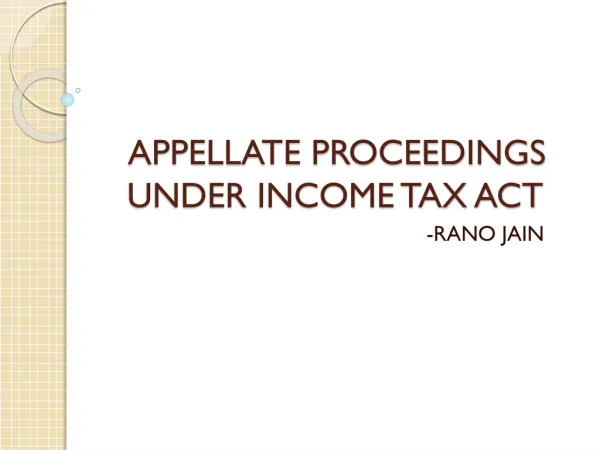
APPELLATE PROCEEDINGS UNDER INCOME TAX ACT
APPELLATE PROCEEDINGS UNDER INCOME TAX ACT . -RANO JAIN. CIT(A). APPEALLABLE ORDERS. Section 246A In general: 143(3) 144 147 153A/153C 271 Order passed by A.O., after expiry of time to file objections before DRP, if the assessee opts not to go to DRP.
816 views • 44 slides
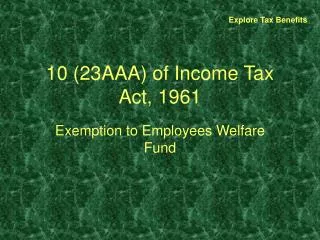
10 (23AAA) of Income Tax Act, 1961
Explore Tax Benefits. 10 (23AAA) of Income Tax Act, 1961. Exemption to Employees Welfare Fund . Agenda. About Section 10 (23AAA) Requirements to establish the fund Benefits to Employer Company Benefits to Employees About us Contact. About Section 10 (23AAA).
566 views • 8 slides
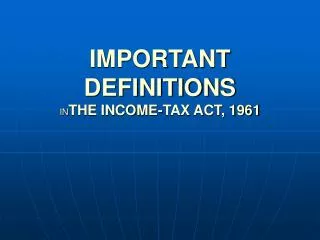
IMPORTANT DEFINITIONS IN THE INCOME-TAX ACT, 1961
IMPORTANT DEFINITIONS IN THE INCOME-TAX ACT, 1961. Learning Objectives. After studying this unit, you would be able to understand and appreciate . • the meaning of the important terms used in the Income-tax Act, 1961 • the scope of definition of those terms for the purposes of this Act.
681 views • 17 slides
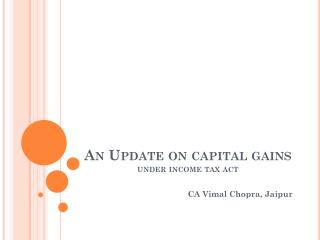
An Update on capital gains under income tax act
An Update on capital gains under income tax act. CA Vimal Chopra, Jaipur. sections. 2(1A) - Agriculture income v/s. Agriculture land 2(14) - Capital Asset 2(22B) - Fair Market Value 2(24)(vi)- any capital gain chargeable u/s 45 2(26) Indian company
162 views • 0 slides
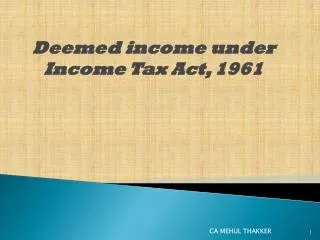
Deemed income under Income Tax Act, 1961
Deemed income under Income Tax Act, 1961. Solution to issue no. 1. Let’s consider the provisions of section 41 (1) Section 41(1) is applicable if the following conditions are satisfied—
1.19k views • 42 slides
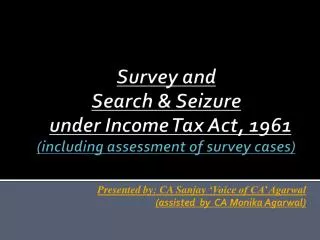
Survey and Search & Seizure under Income Tax Act, 1961 (including assessment of survey cases)
Survey and Search & Seizure under Income Tax Act, 1961 (including assessment of survey cases). Presented by: CA Sanjay ‘Voice of CA’ Agarwal (assisted by CA Monika Agarwal) . Amendements vide Finance Bill 2012.
2.01k views • 167 slides
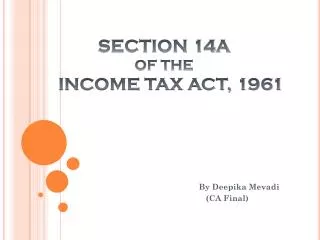
SECTION 14A OF THE INCOME TAX ACT, 1961
SECTION 14A OF THE INCOME TAX ACT, 1961. By Deepika Mevadi (CA Final). Topics Covered. Background of Section 14A Rationale of Section 14A Objective Method of Allocating Expenditure relating to Exempt Income Computation of Disallowance Judicial Decisions (Rule 8D)
814 views • 42 slides
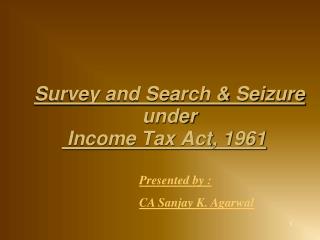
Survey and Search & Seizure under Income Tax Act, 1961
Survey and Search & Seizure under Income Tax Act, 1961. Presented by : CA Sanjay K. Agarwal. Topics for Discussion. Pre Survey & Search precautions. Salient features of survey proceedings. Salient features of Search & Seizure proceedings. Pre Survey & Search precautions.
2.02k views • 149 slides

Tax Audit under section 44AB of Income Tax Act, 1961
Tax Audit under section 44AB of Income Tax Act, 1961. Applicability of Tax Audit (Sec. 44AB).
1.49k views • 76 slides
![Presumptive Income u/s 44AD of Income Tax Act, 1961 [w.e.f. AY 2011- 12]](https://cdn2.slideserve.com/4851709/slide1-dt.jpg)
Presumptive Income u/s 44AD of Income Tax Act, 1961 [w.e.f. AY 2011- 12]
Presumptive Income u/s 44AD of Income Tax Act, 1961 [w.e.f. AY 2011- 12]. Applicability Any business except the business of plying, hiring or leasing goods carriages specified u/s 44AE whose Total Turnover or Gross Receipts in the Previous Year does not exceed Rs. 60 Lakhs.
243 views • 5 slides
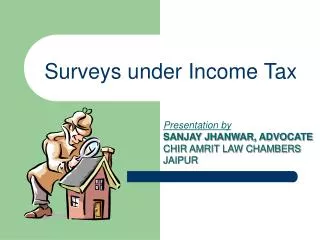
Surveys under Income Tax
Surveys under Income Tax. Presentation by SANJAY JHANWAR, ADVOCATE CHIR AMRIT LAW CHAMBERS JAIPUR. Statutory Provisions. Sec 133A. CEREMONIAL SURVEY (Sub Section 5). BUSINESS SURVEY (Sub Sec 1 to 4). MASS SURVEY. Sec 133B. Business Survey. Who can do Survey:
271 views • 14 slides
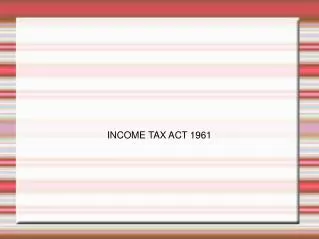
INCOME TAX ACT 1961
INCOME TAX ACT 1961. INTRODUCTION. Brought into force from 1.4.1962 Applies to the whole of India including sikkim and Jammu &Kashmir T he Act has been amended and reamended so drastically that it has become very complicated for the administering authorities as well as for the tax payers
625 views • 16 slides
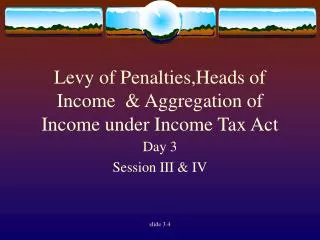
Levy of Penalties,Heads of Income & Aggregation of Income under Income Tax Act
Levy of Penalties,Heads of Income & Aggregation of Income under Income Tax Act. Day 3 Session III & IV. INTRODUCTION. Increase in tax payers call for more reliance on voluntary compliance of tax laws by assessees
1.1k views • 55 slides

“Assessment Proceedings & Appeals under the Income Tax Act, 1961” Ajay Wadhwa Chartered Accountant
“Assessment Proceedings & Appeals under the Income Tax Act, 1961” Ajay Wadhwa Chartered Accountant A-445, Ground floor, Defence Colony, New Delhi - 110024 # 9818653331 ajaywadhwatax@gmail.com. ASSESSMENT PROCEEDINGS. 1. First step - Examine Service of notice u/s 143(2).
640 views • 40 slides

Section 44AB of Income Tax Act, 1961
Tax Audit. Section 44AB of Income Tax Act, 1961 Audit of accounts of certain persons carrying on business or profession. A.Y. 2014-15. Presented By: CA. Sanjay Agarwal Assisted By: CA Apoorva Bhardwaj & CA Jyoti Kaur. Email id: agarwal.s.ca@gmail.com. Contents…. Tax Audit Report
2.78k views • 232 slides
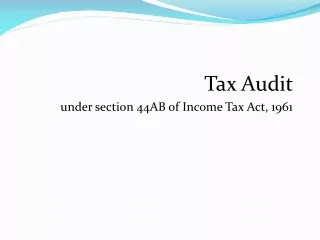
Tax Audit under section 44AB of Income Tax Act, 1961
Tax Audit under section 44AB of Income Tax Act, 1961. Audit Report : Form No. 3CA First part:
868 views • 82 slides

INCOME TAX ACT 1961
INCOME TAX ACT 1961. INTRODUCTION. Brought into force from 1.4.1962 Applies to the whole of India including sikkim and Jammu &Kashmir T he Act has been amended and reamended so drastically that it has become very complicated for the administering authorities as well as for the tax payers
264 views • 16 slides

10 (23AAA) of Income Tax Act, 1961
Explore Tax Benefits. 10 (23AAA) of Income Tax Act, 1961. Exemption to Employees Welfare Fund. Agenda. About Section 10 (23AAA) Requirements to establish the fund Benefits to Employer Company Benefits to Employees About us Contact. About Section 10 (23AAA).
145 views • 8 slides

Rates of depreciation as per income tax act 1961
Learn About rate of depreciation as per Income tax 1961, we are leading Top Chartered Accountant Company in Jaipur, CA firms for articleship in Jaipur, also Best Business Consulting CA Company in Jaipur and Top Accounting Audit Services and Best CA Firms in Jaipur












![Presumptive Income u/s 44AD of Income Tax Act, 1961 [w.e.f. AY 2011- 12]](https://cdn2.slideserve.com/4851709/slide1-dt.jpg)








